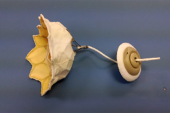CHOICE-MI: TMVR Mortality Much Lower With Newer Transseptal Devices
Mortality is high with earlier devices delivered transapically, so the transseptal approach is the way to go, a researcher says.

Though 30-day mortality was high after transcatheter mitral valve replacement (TMVR) in patients not suitable for transcatheter edge-to-edge repair (TEER) or surgery who were enrolled in the global CHOICE-MI registry, that was driven by use of earlier devices delivered transapically, a new analysis shows.
Overall, there was a big jump between procedural mortality (1.8%) and 30-day mortality (9.9%) in the registry, in which 10 different dedicated devices were used, a gap mirrored in patients treated with a device delivered transapically (2.0% to 10.3%). Among patients who received a newer device delivered via the transseptal approach, however, there were no procedural deaths and only one (4.0%) by 30 days.
Moreover, TMVR outcomes were particularly promising in patients with mitral annular calcification (MAC) versus other etiologies of mitral regurgitation (MR).
Walid Ben Ali, MD, PhD (Montreal Heart Institute, Canada), reported those additional findings—and others—recently during the virtual Society of Thoracic Surgeons (STS) 2022 meeting. Initial results from the CHOICE-MI registry were released last year at PCR London Valves.
“Regardless of MR etiology, TMVI [transcatheter mitral valve implantation] was associated with high technical success, low procedural mortality, low rates of procedural complications, especially with the transseptal approach, durable MR elimination in the majority of patients, optimal results in MAC patients,” Ben Ali concluded during his presentation. “In the light of these results, TMVI may represent a complementary treatment for anatomically suitable MR unsuitable for surgery or TEER.”
More From CHOICE-MI
Though clinical trials of dedicated TMVR devices in patients with severe symptomatic MR who are unsuitable for surgery of TEER have yielded promising results, Ben Ali said, real-world outcome data are limited: a gap the CHOICE-MI registry was designed to fill.
Last year at PCR London Valves, Alison Duncan, MBBS, PhD (Royal Brompton Hospital, London, England), reported that within the registry, TMVR provided durable elimination of MR in most patients, albeit with relatively high rates of access-site complications (9.6%) and all-cause death/heart failure (HF) hospitalization at 1 year (39.2%).
The journey is long, and we have to continue to improve these devices. Ben Ali
At STS 2022, Ben Ali reported additional analyses focused on patients who failed to quality for TMVR (screening failures), patients with MAC, the comparison between transapical and transseptal, and factors independently associated with the primary outcome of all-cause death/HF hospitalization.
Of 767 patients initially enrolled in the registry, 229 (30%) were deemed eligible for TMVR after screening, which means they had relevant mitral disease, a high risk for surgery, and suboptimal anatomy for TEER. The ineligible patients were treated with bailout TEER, high-risk surgery, or medical therapy. The most common reason for screen failure was an annular dimension outside of the treatment range of the devices (37.7%), followed by a high predicted risk of LV outflow tract (LVOT) obstruction (24.1%) and a small LV size (12.1%).
Of the TMVR-eligible patients, the etiology of MR was primary in 28.8%, secondary in 58.4%, mixed in 12.8%, and MAC in 11.8%.
Technical success of the procedure was high both overall (95.2%) and across groups defined by etiology and access type. MVARC-defined procedural and 30-day mortality varied, however. Superior results were seen when the devices were delivered via the transseptal versus transapical approach, even though this group was at higher risk according to the STS score (7.3% vs 5.5%). Patients with mixed primary/secondary MR had the highest rates of procedural and 30-day mortality (5.0% and 25.0%), whereas MAC patients had the lowest (zero and 4.0%).
But patients with MAC had the highest rates of various complications, too, including LVOT obstruction (7.4%), access-site complications (22.2%), and renal failure (26.1%).
The rate of the primary composite outcome of 1-year all-cause mortality/HF hospitalization did not differ significantly based on the etiology of MR. Older age, chronic obstructive pulmonary disease, and transapical access emerged as factors that were independently associated that outcome.
As reported previously, TMVR eliminated MR (residual MR < 1+) in a high percentage of patients at discharge (83.9%) and 1 year (72.2%), and Ben Ali noted that the elimination rate was highest at 1 year among patients with MAC (78.6%).
Transseptal the ‘Way to Go’
Vinod Thourani, MD (Piedmont Heart Institute, Atlanta, GA), one of the session’s moderators, noted that there are currently no dedicated transcatheter devices that have been approved for mitral valve replacement and highlighted the “staggering” 30-day mortality rate in the overall registry, asking Ben Ali why there was a fivefold increase between the procedure and that time point.
Ben Ali responded by pointing to the comparison between the older transapical and newer transseptal devices—like Cardiovalve, Evoque (Edwards Lifesciences), and Cephea (Abbott)—showing much lower mortality in the latter group. The message, he said, is that “the way to go now for TMVI is the transseptal approach and not the transapical approach.”
Overall, the registry shows that TMVR “is achieving good results,” Ben Ali told TCTMD, “I’m not saying that it’s an alternative to transcatheter edge-to-edge repair, but the message is [that it’s] a complementary treatment for anatomically suitable patients but not suitable for surgery or TEER. We have another tool in our pocket to treat these patients.”
And for MAC patients in particular, he said, “I think we have to address these patients with a newer device, because we are achieving very nice results.”
Still, there is a need for further refinements in valve technology, including the extension and stability of the transseptal delivery systems, Ben Ali noted. “The journey is long, and we have to continue to improve these devices.”
Todd Neale is the Associate News Editor for TCTMD and a Senior Medical Journalist. He got his start in journalism at …
Read Full BioSources
Ben Ali W. 1-year outcomes after transcatheter mitral valve implantation: results from the global CHOICE-MI registry. Presented at: STS 2022. January 29, 2022.
Disclosures
- Ben Ali reports research grants, honoraria, or consulting fees from Edwards Lifesciences and Medtronic.





Comments